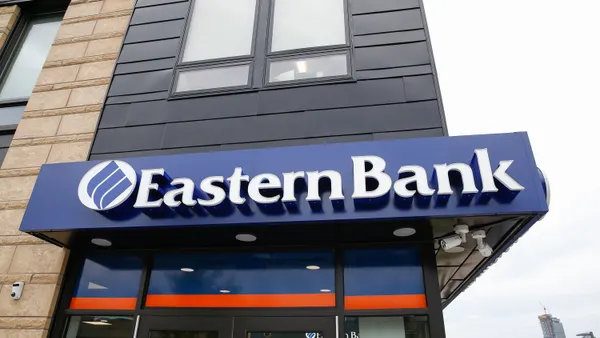Dive Brief:
-
PNC on Wednesday reported profit of $1.5 billion, up slightly from the $1.4 billion it posted in last year's third quarter but well below the $3.7 billion it saw in the second quarter, when the bank divested its 22.4% stake in asset manager BlackRock.
-
The bank set aside $52 million during the third quarter in preparation for bad loans amid the pandemic, a sharp decrease from the $2.4 billion it reserved in the previous quarter. Bill Demchak, PNC's chairman, president and CEO, said the decrease reflects the bank's "stable reserve levels."
-
PNC's total revenue was up 1% from the third quarter of 2019, to $4.3 billion.
Dive Insight:
"We continue to execute on our strategic priorities, including ongoing investments in our national expansion and digital offerings," Demchak said. "We have substantial capital and liquidity flexibility, and remain well positioned to take advantage of potential investment opportunities to enhance shareholder value."
The BlackRock divestiture net the Pittsburgh-based bank $14.2 billion. Demchak has hinted at the bank's strategy to use its new capital to buy distressed assets amid the economic downturn caused by the coronavirus.
Demchak said in June the bank is interested in a sale that would push its assets past $700 billion. But on Wednesday, he said the bank is open to using the capital from the BlackRock sale for a series of smaller deals.
"They require a fair amount of work for less total return," he said. "We could do a bunch of them over time."
Demchak also reiterated the bank's strategy to take its time as it seeks opportunities for an acquisition.
"The environment for banks, notwithstanding COVID, is going to be tough going forward for all the obvious reasons. So we continue to think that there's going to be a lot of opportunities out there," he said. "Trying to spend as much capital as we have all in a big hurry almost never works out or makes sense."
During a call with analysts on Wednesday, Demchak was asked how the outcome of the 2020 election might affect PNC's acquisition strategy.
Demchak downplayed the risk a Biden administration could pose to any future big bank deals.
"If we were to do a deal and not cause a systemic risk to the economy, ultimately it has to go through an approval process to be approved," he said. "They can delay it, they can hold hearings, they can do all sorts of different things, but basically, it gets approved.
"Even in a change in administration, the assumption that somehow they either change laws on this particular issue, or even if they switch governors, the regulatory process is still the same. So I don't know that that's a real risk," he said.












